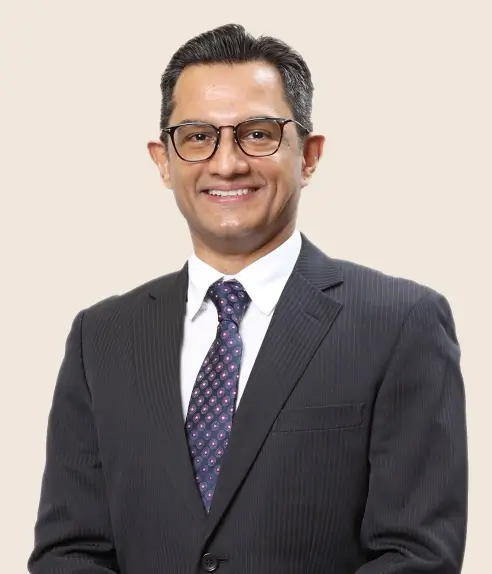Unveiling the Power of Medical Imaging
Radiology is essential fields within medical imaging that have revolutionised the way we diagnose and treat diseases. Radiology involves using various imaging techniques such as X-rays, CT scans, and MRI scans to obtain detailed images of the body's internal structures. These images provide valuable insights into the presence of abnormalities or injuries, helping physicians make accurate diagnoses and plan appropriate treatments.
Radiology contributes significantly to patient care by providing valuable diagnostic information, guiding therapeutic procedures, and supporting the evaluation of treatment effectiveness.
Comprehensive Radiology Services at Prince Court
Our radiology offers a wide range of diagnostic and interventional radiology imaging services. Our dedicated team of professionals is committed to providing accurate and timely results for both in-patients and out-patients.
Diagnostic Radiology
Using external radiation, our diagnostic radiology services produce high-quality images of the body, organs, and internal structures for medical diagnostic purposes. Our offerings include a wide range of services designed to cater to both adults and paediatric patients.
- General Radiography: Our state-of-the-art X-ray machine is capable of capturing detailed images of various body parts, ensuring accurate diagnosis and treatment planning for patients of all ages, including paediatric needs.
- Computerised Radiography (CR) and Digital Radiography (DR): We utilise advanced CR and DR technologies to provide faster and more efficient image acquisition, reducing patient exposure to radiation and enhancing overall diagnostic accuracy.
- Digital Fluoroscopy: Our digital fluoroscopy equipment enables real-time imaging of moving body structures, allowing for dynamic visualisation and assessment of organ function and abnormalities. This is especially useful for procedures requiring the evaluation of gastrointestinal functions and other dynamic processes.
- Barium and Gastrointestinal Studies: Our radiology department performs barium studies to assess the digestive system, helping to identify conditions such as gastroesophageal reflux disease (GERD), ulcers, and tumours. These studies can be tailored to meet the specific needs of paediatric patients, ensuring their comfort and safety throughout the procedure.
- Hysterosalpingography (HSG): This specialised procedure involves the use of contrast dye to evaluate the uterus and fallopian tubes in women. Our experienced radiologists perform HSG exams with precision, taking into account the unique requirements of each patient.
- Arthrograms: We offer arthrography services to visualise and diagnose joint conditions, such as injuries, inflammation, or abnormalities. Our musculoskeletal radiologists are skilled in performing arthrograms on both adult and paediatric patients, ensuring accurate evaluation of joint health.
- Urinary System Studies: Our diagnostic radiology services encompass comprehensive urinary system studies, including imaging of the kidneys, bladder, and ureters. Our advanced imaging technology allows for precise visualisation of urinary tract conditions in patients of all ages.
Ultrasound
Utilising high-frequency sound waves, ultrasound enables us to create detailed images of body parts and organs without the use of ionizing radiation. Our ultrasound services feature state-of-the-art, fully digital ultrasound equipment with multiple transducers, allowing us to perform a full range of B-mode grayscale and Doppler diagnostic studies. Additionally, we provide specialised ultrasound-guided biopsies and interventions.
- Ultrasound-guided biopsies: During an ultrasound-guided biopsy, our radiologist uses ultrasound imaging to locate and visualise a specific target area, such as a suspicious mass or lesion. Real-time ultrasound images assist in guiding the insertion of a needle or biopsy instrument to precisely extract tissue samples. The ultrasound guidance ensures accurate targeting of the tissue, increasing the likelihood of obtaining representative and diagnostic samples.
- Ultrasound-guided interventions: Ultrasound-guided interventions encompass a range of minimally invasive procedures, including cyst aspirations, abscess drainage, joint injections, and nerve blocks. By utilising real-time visualisation provided by ultrasound imaging, we ensure precise needle or instrument placement, minimising the risk of complications and maximizing the effectiveness of each procedure.
Magnetic Resonance Imaging (MRI)
Utilising the power of magnetic fields and radio waves, Magnetic Resonance Imaging (MRI) is a sophisticated imaging technique that provides highly detailed images of the body.
Our MRI department features a cutting-edge 1.5 and 3T Tesla high-performance MRI systems, which enable us to capture images for various medical purposes. It allows for precise imaging of neurology-related conditions, including the head and spine. It also offers exceptional capabilities for musculoskeletal imaging, allowing us to assess and diagnose issues affecting the bones, joints, and soft tissues. Additionally, our MRI services extend to full-body imaging, providing comprehensive insights into different regions and systems of the body.
We understand the importance of specialised imaging for specific areas of concern. That is why we offer specialised MRI procedures to cater to specific medical needs:
- MR Angiography: Our MR angiography utilises MRI technology to assess blood vessels and identify any abnormalities or blockages. It provides detailed images of the arterial and venous structures, helping in the diagnosis and assessment of various vascular conditions, such as aneurysms, stenosis, and vascular malformations.
- Breast MRI: Breast MRI is a specialised imaging procedure used to examine the breast tissue in detail. It is often performed as a supplemental screening tool for women with a high risk of breast cancer or for further evaluation of suspicious findings from mammography or ultrasound. Breast MRI can help detect and characterise breast lesions, evaluate the extent of disease, and aid in surgical planning.
- MRI Spectroscopy: MRI spectroscopy enables us to study the chemical composition of tissues, aiding in the diagnosis and monitoring of certain diseases. MRI spectroscopy is particularly useful in evaluating brain tumours, monitoring treatment response, and studying neurological disorders.
- MRI Prostate with Endorectal Coil: For precise evaluation of the prostate gland, we offer MRI prostate with endorectal coil, which enhances imaging accuracy in this area. This procedure helps in the detection and characterization of prostate cancer, evaluation of tumour extent, and guidance for targeted biopsies and treatment planning.
Computerised Tomography (CT Scan)
With our 640-slice high-end CT system, we can perform head, neck, chest, abdomen, pelvis, extremities, and spine examinations. Our CT services cover a wide range of applications, including coronary calcium CT, coronary CTA, CT angiography of selected regions (e.g., CTA pulmonary), low-dose lung CT, virtual CT colonoscopy, CT urography, CT-guided biopsy, radiofrequency ablation (RFA) of tumour under CT, and paediatric low-dose imaging.
- Coronary Calcium CT: We provide specialised procedures such as coronary calcium CT, which assesses the build-up of calcified plaque in the coronary arteries to evaluate the risk of heart disease.
- Coronary CTA: Our coronary CTA (Computed Tomography Angiography) enables the visualisation and assessment of the coronary arteries, aiding in the diagnosis of conditions such as blockages or arterial abnormalities. It involves the injection of a contrast injection into the bloodstream to capture images of the heart.
- CT Angiography: We offer CT angiography of selected regions, including the brain, pulmonary arteries and peripheral vascular trace to help diagnose conditions.
- Low-dose Lung CT: Our low-dose lung CT is specifically designed to minimise radiation exposure while ensuring accurate imaging for the detection and monitoring of lung conditions. It involves a low radiation dose CT scan of the chest, which can help identify early-stage lung cancers when they are more treatable. This screening is typically recommended for individuals with a significant smoking history.
- Virtual Colonoscopy CT: For non-invasive examination of the colon, our virtual colonoscopy CT offers an alternative to traditional colonoscopy, providing detailed images for the detection of polyps or other abnormalities.
- CT Urography: Our CT urography is a valuable tool for visualising the urinary system, assisting in the diagnosis and monitoring of conditions such as kidney stones or urinary tract infections. It involves the injection of a contrast dye and capturing multiple CT images of the kidneys, ureters, and bladder.
- CT-Guided Biopsy: We provide CT-guided biopsy procedures, enabling precise targeting of tissues for sampling under the guidance of real-time CT imaging.
- Radiofrequency Ablation (RFA): Our advanced CT system facilitates radiofrequency ablation (RFA) for tumours, allowing for minimally invasive treatment under CT guidance. It involves the insertion of a needle or electrode into the targeted area, which then generates heat to destroy the abnormal cells. RFA is commonly used for the treatment of certain tumours, such as liver tumours or renal cell carcinoma, as well as other conditions.
Women's Imaging
Our dedicated women's imaging services encompass 2D full-field digital mammography, 3D tomosynthesis mammography, breast ultrasound, breast MRI, bone densitometry (DEXA), and breast biopsies (ultrasound or stereotactic guided).
- Tomosynthesis mammography: Tomosynthesis mammography is a cutting-edge technique that captures multiple images of the breast from different angles. This three-dimensional imaging technology enhances the detection and characterisation of breast abnormalities, improving the accuracy of breast cancer screening and diagnosis.
- Breast Ultrasound: In addition to mammography, we offer breast ultrasound, a non-invasive imaging technique that uses sound waves to create detailed images of the breast tissue. Breast ultrasound is particularly useful for evaluating breast lumps or cysts, providing valuable information for further assessment and diagnosis.
- Breast MRI: For more complex cases and comprehensive evaluation, we offer breast MRI (Magnetic Resonance Imaging). Breast MRI provides highly detailed images of the breast tissue, helping in the detection and characterisation of breast lesions. It is especially beneficial for high-risk individuals and those with a history of breast cancer, as it provides valuable information for treatment planning and monitoring.
- Bone densitometry (DEXA): Bone densitometry, also known as DEXA (Dual-Energy X-ray Absorptiometry), is a specialised imaging technique used to measure bone mineral density. It is a key tool in the assessment and monitoring of osteoporosis and helps in the evaluation of fracture risk.
- Breast Biopsy: When a suspicious breast abnormality is detected, our experienced team performs breast biopsies using either ultrasound or stereotactic guidance. These minimally invasive procedures involve the precise sampling of breast tissue for pathological analysis, aiding in the diagnosis of breast conditions and providing essential information for further treatment planning.
Angiography & Interventional Procedures
At Prince Court Medical Centre, our Interventional Radiology (IR) team specializes in minimally invasive, image-guided procedures that serve both diagnostic and therapeutic purposes. These procedures often provide effective alternatives to surgery—offering shorter recovery times, lower risks, and less discomfort for patients.
Interventional Radiology Services
Our advanced Angiography Suite is equipped with state-of-the-art Digital Subtraction Angiography (DSA) systems, enabling our specialists to perform high-precision procedures across various specialties.
Special Focus: Neurointerventional Procedures
With a dedicated Neurointerventional Radiologist, Prince Court MC is proud to offer comprehensive neurovascular interventional services, making us one of the few centers in the region with this expertise.
Key Procedures:
- Cerebral Angiography
Diagnostic imaging of brain vessels for stroke, aneurysm, AVMs, and other vascular malformations. - Mechanical Thrombectomy
Emergency treatment for acute ischemic stroke by removing clots to restore blood flow. - Aneurysm Coiling / Embolization
Minimally invasive procedure to seal brain aneurysms and reduce rupture risk. - AVM Coiling / Embolization Using image guidance, a catheter is navigated into the AVM, and embolic agents (such as glue or coils) are injected to block the abnormal vessels. This reduces the risk of bleeding and may serve as a standalone treatment or preparation before surgery or radiosurgery.
- Carotid Stenting & Angioplasty
Treats narrowing of neck arteries to help prevent stroke. - Pre-Op Tumor Embolization
Blocks blood flow to brain, head, or neck tumors for pre-surgical shrinkage or symptom relief. - Spinal Angiography & Interventions
Assess and treat spinal vascular malformations.
General ( Non Head & Neck ) Interventional Angiography Procedures
Peripheral Vascular Interventions
- Peripheral Angiography – Evaluates limb and abdominal vessel blockages.
- Angioplasty & Stenting – Reopens narrowed arteries in the legs or arms.
Visceral & Abdominal Interventions
- Renal Artery Angioplasty/Stenting – For high blood pressure or kidney-related arterial disease.
- Mesenteric Angiography – Assesses intestinal blood supply in GI bleeding or ischemia.
- Aortic Angiography – Evaluates aneurysms, dissections, and other aortic conditions.
Gynecological Interventions
- Uterine Artery Embolization (UAE) – Minimally invasive treatment for fibroids.
Vascular Access & Dialysis Support
- Non Tunneled Dialysis Catheter Insertion / PICC
- AV Fistula Angioplasty (Fistuloplasty)
- Thrombectomy for AV Fistula/Graft
- Permanent-Cath / Chemoport Insertion
Emergency Interventions
- Embolization for Internal Bleeding – Used in trauma or GI hemorrhage to control bleeding.
- Postpartum Hemorrhage Embolization – Life-saving control of obstetric bleeding.
Why Choose Interventional Radiology at Prince Court MC?
- Highly skilled team including a Neurointerventional Radiologist
- Latest-generation equipment for high-precision procedures
- Multidisciplinary collaboration with Neurosurgery, Cardiology, Oncology, and Nephrology
- Patient-centered care with minimal downtime
For more information or enquiry, call us at +6012 3784593 or WhatsApp.


























